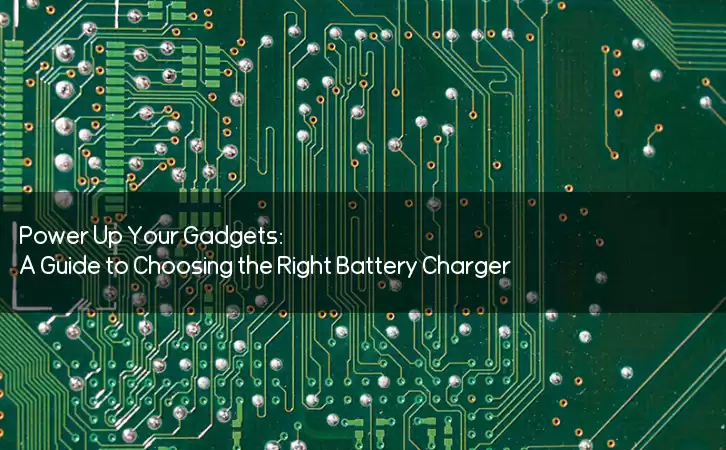Information Center
Power Up Your Gadgets: A Guide to Choosing the Right Battery Charger
Published:2023-06-25 20:35:09 Author:Green WCND Views:32Battery Charger Circuit: A Guide to Charging Your Electronic Devices

Battery chargers are an important part of modern life, allowing us to charge our various electronic devices such as smartphones, tablets, laptops, and cameras. However, not all battery chargers are created equal, with some being more efficient and reliable than others. In this article, we will discuss the basics of how a battery charger circuit works, the different types of battery chargers, and some important considerations when choosing a charger for your electronic gadgets.

How Does a Battery Charger Circuit Work?

A battery charger circuit is designed to convert AC power from a wall socket to DC power that is compatible with the battery in our device. A typical battery charger circuit consists of four main components: the transformer, rectifier, filter, and voltage regulator.
The transformer converts the AC voltage from the wall socket to a lower AC voltage suitable for the rest of the circuit. The rectifier then converts the AC voltage to a pulsating DC voltage. This pulsating DC voltage must then be smoothed out by the filter to become a smooth DC voltage. Finally, the voltage regulator limits the output voltage to a specific level suitable for the battery being charged.
Types of Battery Chargers
There are different types of battery chargers available in the market. The most common types include:
1. Standard Battery Charger: This type of charger is the most basic form of a battery charger and is commonly used for charging lead-acid batteries. They are simple in design, with no safety features or charging algorithm.
2. Trickle Charger: This charger provides a low and constant current charge to the battery, which helps maintain the battery’s charge level. They are suitable for smaller batteries that are not regularly used.
3. Fast Charger: These chargers can charge a battery much quicker than a standard charger, generating a lot of heat in the process. They also have safety features to prevent overcharging and overheating.
4. Intelligent Charger: This charger has a microprocessor that monitors the battery charge level and adjusts the charging current and voltage accordingly. They are the most efficient and safe type of charger.
Considerations when Choosing a Battery Charger
When choosing a battery charger, there are several important factors to consider to ensure the safety and optimal performance of your electronic device’s battery.
1. Battery Type: Different battery types have different charging requirements. It is important to choose a charger that is compatible with the specific battery chemistry in your device.
2. Capacity: The charger should be able to deliver enough current to quickly and efficiently charge your device’s battery. Check the battery charging specifications in your device’s manual or on the manufacturer’s website.
3. Safety Features: A good charger should have safety features such as overcharge protection, temperature monitoring, and short-circuit protection.
4. Price: The cost of the charger is an important consideration, but it should not be the only factor. A low-cost charger may not provide the safety features and efficiency needed to avoid damage to your device’s battery.
Conclusion
Battery chargers are an essential part of modern life, and understanding how they work and choosing the right type of charger for your electronic devices is important. A battery charger circuit has four main components, and there are different types of chargers available in the market, including standard, trickle, fast, and intelligent chargers. When choosing a battery charger, consider the battery type, capacity, safety features, and price, and choose one that is compatible with your device’s battery and will provide safe and efficient charging.
As a manufacturer dedicated to providing high-quality kitchen appliances, choosing the right power adapter for your rice cooker is crucial to ensuring product s···
As a manufacturer of all-in-one desktop PCs, the power adapter serves as the "invisible guardian" of stable device operation. It must not only precise···
IntroductionGolf carts serve as vital transportation tools on golf courses, and their performance and reliability are crucial for enhancing player experience an···
The battery pack is the heart of a golf cart, silently powering every acceleration and climb on the green. However, battery degradation often goes unnoticed, mu···





